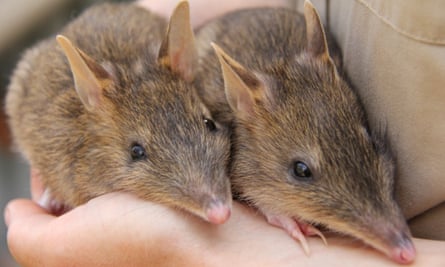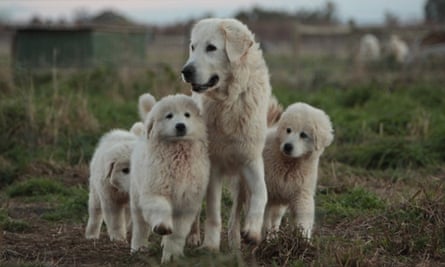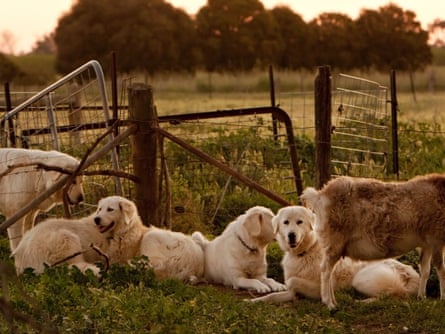Teams of highly trained dogs will be deployed as “bodyguards” for bandicoots threatened by feral cats and foxes, in an initiative which could help reverse the precipitous decline in several other Australian native species.
Zoos Victoria is to run an extensive trial to determine whether groups of Maremma dogs can become trusted allies to the eastern barred bandicoot, which has been virtually wiped out in Australia.
The small marsupial is extinct in the wild on mainland Australia, with a modest population remaining in Tasmania. A captive population of around 400 bandicoots is spread across four breeding sites in Australia.
Feral cats and foxes have preyed upon the bandicoots with disastrous results. Previous attempts to breed them in fenced areas have had limited success.

Zoos Victoria will take on a full-time dog trainer to work with seven Maremma puppies. The dogs, which like to work in pairs, will be sent to three different test sites in Victoria to see if they can effectively protect bandicoots without the need for fences. The spare Maremma puppy will be used by Zoos Victoria as a fundraising ambassador.
Maremma dogs, a type of sheepdog that originated in Italy, have been used for centuries to guard livestock. But they have also recently been used in more unusual conservation efforts.
In 2006, the dogs were introduced to Middle Island in Victoria, to help protect a colony of little penguins. Foxes had wreaked havoc on the island, reducing the 1,500-strong colony to less than 10 by killing swaths of the penguins.
However, the introduction of Oddball, a Maremma dog that previously guarded chickens, provided the penguins with some canine muscle. Oddball, who was later joined by other dogs, chased away the foxes and penguin numbers subsequently revived.
Maremma dogs are considered ideal for conservation work because they can bond to an array of other creatures while also viewing feral pests as mortal enemies. The dogs have formed friendships with sheep, goats, chickens and gannets in the past. In controlled experiments, sheep that heard dingo calls instinctively ran behind the dogs for protection.

In the first trial in Tiverton in western Victoria, bandicoots will be bred in a fenced area while a further 50 will be bred in an unfenced area guarded by a pair of dogs. Zoos Victoria will socialise the dogs with the bandicoots and teach them to guard the area, over an intensive two-year training period.
If successful, further dogs will be dragooned to create the fighting extinction dog squad, which will bravely battle feral pests that threaten an array of native species. Animals that could benefit from this approach include wallabies, mice and even the kiwi in New Zealand.
Rachel Lowry, director of wildlife conservation at Zoos Victoria, told Guardian Australia that the dogs could prove crucial in helping preserve bandicoot numbers.

“We really want to get the numbers up to 2,500 in the next five years and if this works we will well and truly be able to do that,” she said.
“Maremmas are a beautiful dog breed, very intelligent. I’d expect them to protect the bandicoots as they did with the penguins. I think they will get on well, but I’ve been advised they like the company of a flock, so we’ll be putting in some sheep with them. Bandicoots are small, run fast and are active at night, so they aren’t as good company.”
Lowry said there was an “endless list” of species that could benefit from guardian dogs if the trials proved fruitful.
“We are desperate for apex predators in Australia because at the moment feral cats and foxes are dominant,” she said. “At the moment, if someone leaves a gate open or a fence is damaged by a kangaroo, foxes can get in and all our breeding work is lost.
“But if you put in a dog, it puts fear into the feral predator because they sense the presence of another apex predator. The potential for this is really exciting.
“The other benefit is that this apex predator is a dog, which we love and are used to having in our homes. It would be a bit more politically difficult to do this with dingoes.”
Beate Sexton, a Maremma owner and dog trainer, said: ‘Maremma aren’t antagonistic to other animals at all. Predators will stalk an animal and fixate on it, whereas a Maremma will avert its gaze, even with people.
“I think they can make a fantastic guardian for animals in need of their protection. This trial is a very good step, I think.”
The initiative will cost $580,000 over five years, and Zoos Victoria is seeking external donations to help fully fund the project.

Comments (…)
Sign in or create your Guardian account to join the discussion